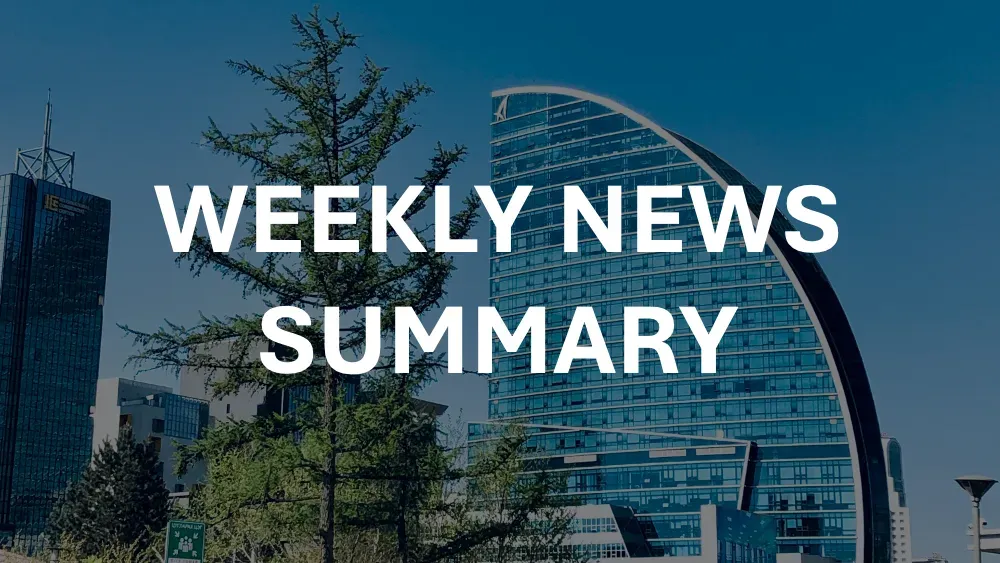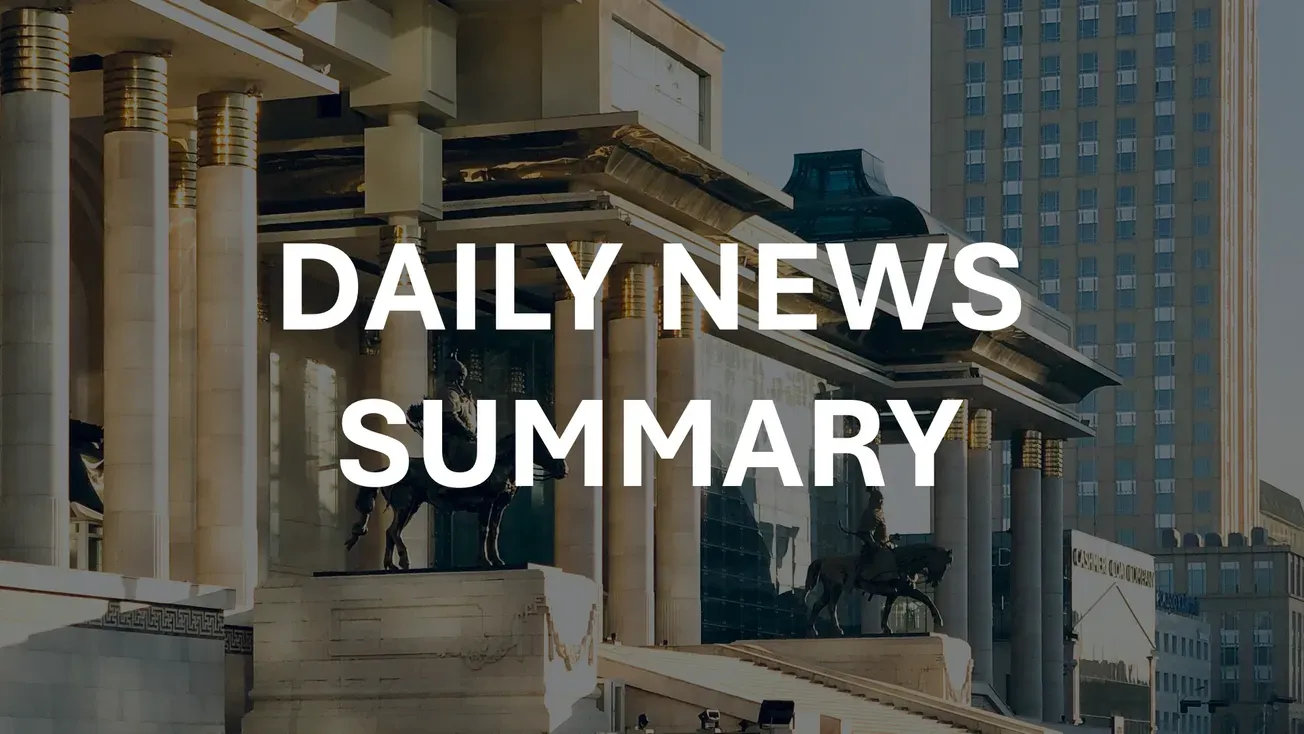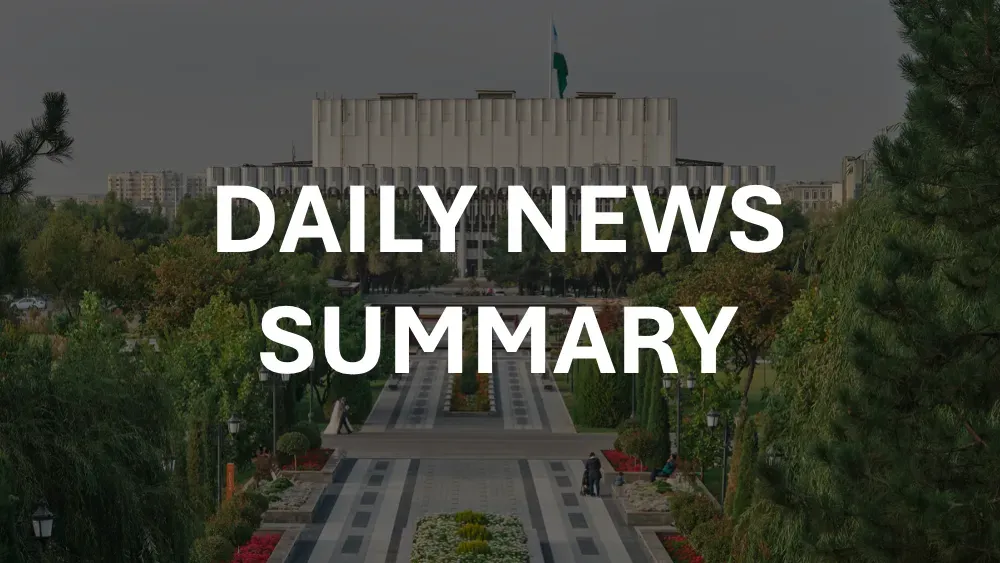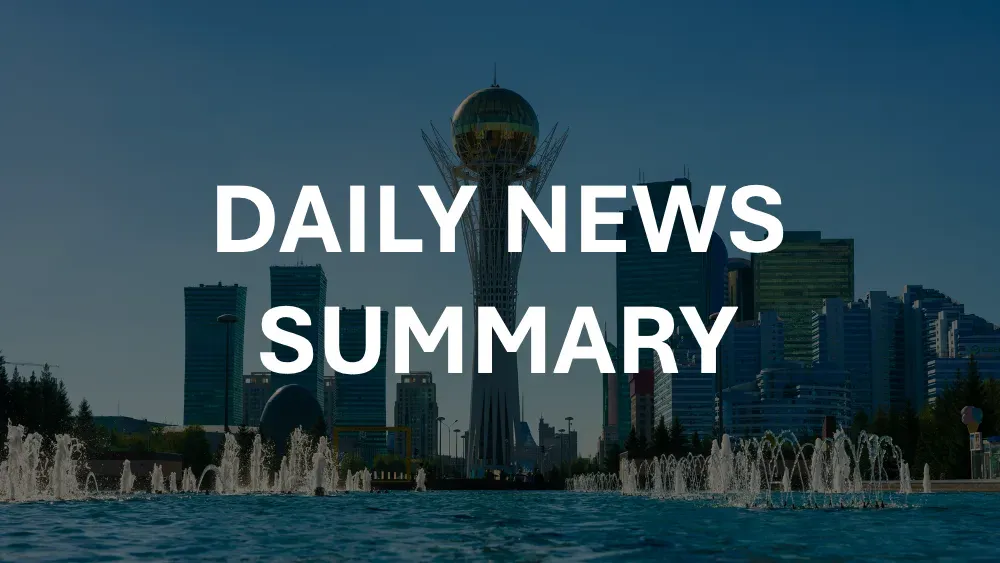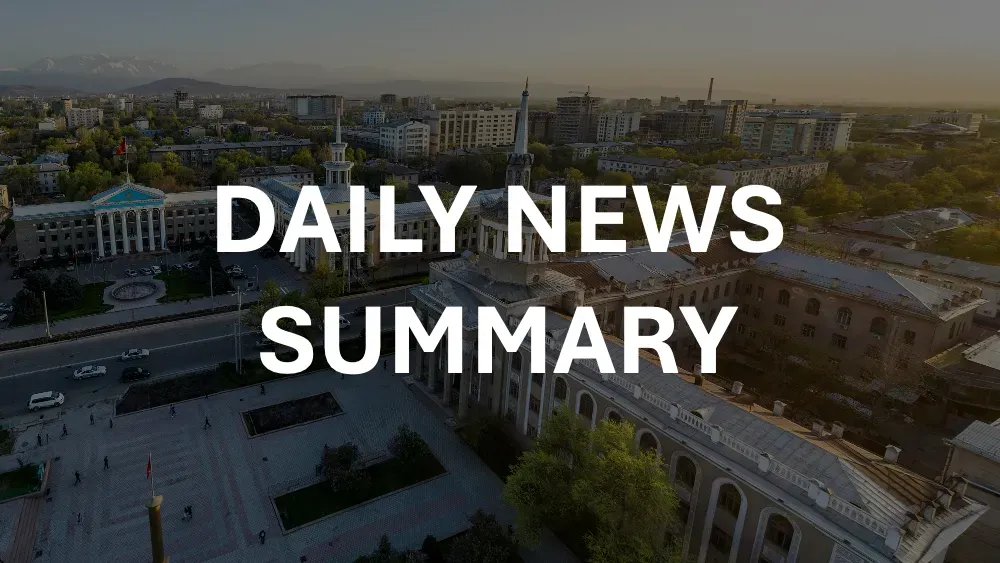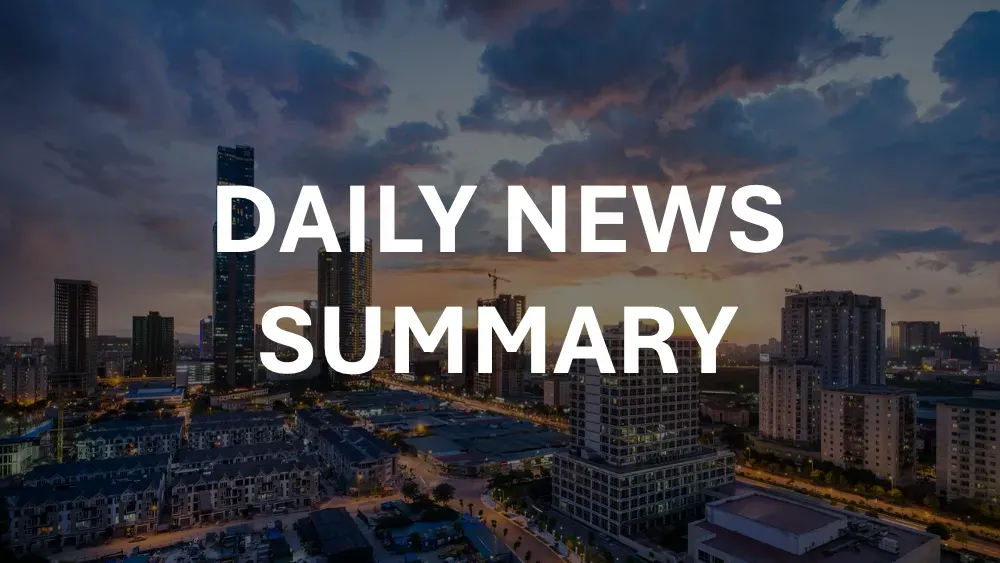This weekly digest showcases just 10 stories. Daily subscribers receive comprehensive intelligence briefs with 40 of the top stories organized by category. Don't miss the stories that matter.
Subscribe to Daily →
September 19, 2025 to September 25, 2025
This week's top 10 stories from Mongolia, selected from our daily intelligence briefs.
1. Mining Outlook Sets MNT 9.3 Trillion Budget Contribution as Sovereign Wealth Fund Talks Begin
Mongolia’s Budget Standing Committee projects mining will contribute MNT 9.3 trillion to the 2026 budget, underpinned by targets of 90 million tonnes of coal, 1.9 million tonnes of copper concentrate, 20 tonnes of gold and 9.4 million tonnes of iron ore. The committee and Industry and Minerals and Finance ministries are pursuing infrastructure upgrades (rail and border capacity), customs digitalization and regulatory adjustments—easing exploration licensing, optimizing royalty rates, channeling sales via the commodity exchange and securing fuel supply—to lift shipments and stabilize foreign-exchange reserves after a 13% year‑on‑year revenue drop driven by lower coal prices. Chair H. Ganhuyag highlighted mining’s macro weight (26% of GDP, 75% of industrial output, 95% of exports), while Finance officials reported MNT 19.3 trillion in revenues through August and signaled tax and VAT adjustments (future heritage fund share of royalties rising from 40% to 65% in 2025; expanded VAT refunds and full e-receipt digitization).
Concurrently, the government has begun negotiations with operators of 16 strategic deposits to channel a larger share of dividends into the National Wealth Fund, per April 2024 legal amendments; Prime Minister G. Zandanshatar framed talks around citizen benefit, public–private partnership and fund growth. Lawmakers pressed for clarity on a petroleum stockpile fund and progress on 14 mega projects affecting 2026 forecasts. For international investors and policy analysts, key implications are heightened state involvement in mineral rents, targeted infrastructure investments to realize export targets, and fiscal adjustments aimed at shoring up revenues amid commodity price volatility.
Local Coverage: montsame.mn, itoim.mn, gogo.mn
From daily briefs: 2025-09-23, 2025-09-25, 2025-09-26
2. Government Opens Talks on Strategic Mines as Industry Warns Against Forced State Stakes
The government has opened negotiations (starting 19 September) with license holders at 16 strategic mineral deposits — including major coal blocks at Tavan Tolgoi (Ukhaa Khudag), Nariin Sukhait and Shivee‑Ovoo — to align revenue sharing with the 2019 constitution and 2024 laws on the National Wealth Fund and minerals. Prime Minister G. Zandanshatar set three priorities (broad citizen benefit, stronger state–private partnership, and growing the wealth fund) and asked parties to present options this year for either defined state equity stakes or a consolidated “resource tax” that would ensure a majority (a “50+1” share) of net resource benefits flow to citizens. Officials say the aim is a standardized approach to state participation and a legislative package for Parliament.
Industry representatives support higher citizen shares but warned against retroactive or coercive changes and urged legal certainty and negotiated solutions; G. Erdenetuya (Mongolian National Mining Association) warned the state cannot reset ownership each time the law changes, while D. Odjargal (MCS Group) backed lawful solutions to bolster the wealth fund. Talks involve firms such as Energy Resources (Ukhaa Khudag) and operators at Nariin Sukhait including MAK and Usukh Zoos, raising political sensitivities because of MP links; the government says all parties will be treated equally in open negotiations.
Local Coverage: ikon.mn, gogo.mn, news.mn, itoim.mn, peak.mn, urug.mn
From daily briefs: 2025-09-22, 2025-09-23
3. ACWA Power Signals Entry with $10B Clean Energy Plan, Backed by Market Reforms
Saudi-based ACWA Power has signaled it will invest at least $10 billion to develop 10 GW of clean energy in Mongolia, following 4–6 months of due diligence on demand, resource potential and export options, Deputy Prime Minister T. Dorjkhand said. Construction is expected to begin next year; the program will target large-scale generation, power for data centers and exports, and is projected to create about 50,000 direct and indirect jobs. Officials estimate initial annual export revenues of roughly $2 billion, with the potential to scale capacity to 50–100 GW as multiple firms consider projects amounting to a combined 50 GW.
Dorjkhand tied the investment to recent tariff and regulatory reforms and policy continuity under the coalition government, calling it the first substantive foreign entry into Mongolia’s energy sector in 40 years. For international investors and regional energy markets, the move signals Mongolia’s opening to private capital and export-oriented clean-power development, with material implications for regional grid links, data-center supply chains, and future investment flows if planned scale-up proceeds.
Local Coverage: gogo.mn, ikon.mn, eagle.mn
From daily brief: 2025-09-25
4. State Bank Raises US$200 Million in 3-Year Bond Listed in Singapore to Expand Green Lending
Mongolia’s State Bank raised US$200 million through a three‑year bond listed on the Singapore Exchange, marking the bank’s first long‑term foreign fundraising and attracting stronger-than‑expected demand from reputed international funds. The issue, priced and placed this month, signals growing investor confidence in the bank’s credit profile and opens a new channel for external financing and deeper investor engagement with Mongolian state‑owned enterprises.
Proceeds will be directed toward environmentally friendly projects, product development and broader credit access, with State Bank targeting green loans to reach 10% of its loan book by 2030. Management frames the deal as supporting Mongolia’s sustainable development goals and potentially bolstering foreign reserve buffers, while expanding lending to key companies and green businesses — a strategic move that could influence sovereign and corporate financing dynamics in the region.
Local Coverage: ikon.mn, eagle.mn, news.mn, itoim.mn
From daily brief: 2025-09-19
5. State-Linked Entities Hold Majority of Bad Loans at Development Bank; Task Force Seeks Repayment Plan
Mongolia’s Development Bank is carrying MNT 1.3 trillion in non‑performing loans (NPLs), of which about MNT 1.045 trillion are exposures to government bodies and state‑owned enterprises, making state‑linked debt the principal credit risk. Large problem loans include financing tied to the Tavan Tolgoi Power Plant (US$15.9m, only US$1.1m repaid; now ~MNT 61bn) and the Egiin Gol hydropower project (US$50m; ~MNT 61bn). The bank’s largest single exposure is the State Housing Finance Corporation (roughly MNT 400bn outstanding) after policy changes disrupted sales‑based repayment streams; Khutul Cement & Lime also owes near MNT 400bn and is subject to litigation over collateral.
A cabinet task force formed in August has begun reallocating certain disputed debts — notably energy project feasibility study loans — to the Energy Ministry, which has three years to fund them from the state budget or settle them internally. The Development Bank has previously recovered MNT 1.8 trillion overall but only about MNT 400bn from NPLs, underscoring that remaining state‑tied liabilities are the primary solvency concern and pose fiscal and governance implications for Mongolia’s public balance sheet and project financing credibility.
Local Coverage: news.mn
From daily brief: 2025-09-19
6. Parliament Weighs Next Steps on Halzan Buregtei Rare Earths Project After Oversight Hearing
Parliamentary standing committees in Mongolia opened a general oversight hearing into the Halzan Buregtei rare earths project in Khovd’s Myangad district after local protests and disputes disrupted operations; MPs, experts and residents debated environmental risks—particularly uranium and thorium in concentrates and tailings—regulatory gaps between mining and nuclear laws, and the adequacy of an Environmental Impact Assessment returned in 2023 for poor baseline data. Officials reiterated national reserves of about 3.1 million tonnes of rare earth oxides across six deposits and said processing remains the key bottleneck; the project operator reported MNT 2.6 billion losses in 2024 and roughly MNT 1 billion in 2025 from delays and social conflict.
Parliament has ordered further committee review, public testimony and potential directives to ministries to clarify licensing, independent multi-lab environmental monitoring, water use constraints and health safeguards before a definitive licensing decision is taken. Lawmakers stressed a “measure seven times, cut once” science-driven approach (MP B. Bayarbaatar), while proponents warned that failure to develop rare earths risks missing global supply-chain opportunities—especially amid Korea-backed research cooperation and efforts to build a processing and R&D hub in Ulaanbaatar.
Local Coverage: urug.mn, itoim.mn, unuudur.mn, gogo.mn, ikon.mn, eagle.mn, news.mn
From daily briefs: 2025-09-23, 2025-09-24, 2025-09-25
7. MCS’s J. Odjargal Backs Clear Rules on ‘Strategic Deposits’ as Government Opens Talks on Tavan Tolgoi Shares
MCS Group chairman J. Odjargal said the company previously ceded five of six licenses—representing 96% of Tavan Tolgoi’s coal reserves—to the Mongolian state and has invested about US$1 billion in the remaining Uhaa Khudag asset, disputing claims that Uhaa Khudag is the core deposit and noting the main reserves sit in Erdenes Tavan Tolgoi’s West and East Tsankhi areas. Speaking as the government opens prime minister-led talks on dividing Tavan Tolgoi shares and aligning resource revenues with the Constitution and a planned National Wealth Fund, Odjargal urged clear, stable rules to preserve investor certainty and attract capital for export expansion.
He called for a precise legal definition of “strategic deposit” (or consideration of “strategic products”) to prevent policy risk that could deter investment, signalling industry concern about retroactive changes to asset classification as Mongolia reshapes its fiscal and ownership framework.
Local Coverage: news.mn, itoim.mn
From daily brief: 2025-09-23
8. U.S. and Mongolia Deepen Defense Ties with Annual Bilateral Talks in Washington
On September 25 in Washington, U.S. Deputy Assistant Secretary Alvaro Smith—responsible for China, Taiwan and Mongolia—and Brig. Gen. D. Gankhuyag, State Secretary of Mongolia’s Ministry of Defense, held their annual bilateral defense talks to expand U.S.-Mongolia security cooperation. Discussions prioritized Indo‑Pacific alignment and concrete steps to scale up joint training and exercises, security assistance, and defense equipment sales, and reviewed specific areas where increased Mongolian defense spending could rapidly boost Armed Forces readiness and capabilities.
The meeting underscored Mongolia’s continued contribution to peacekeeping—commended by Smith as central to its defense posture—and framed the relationship within the Strategic “Third Neighbor” partnership as a tool for regional stability and economic resilience, including supply‑chain diversification. For international professionals, the talks signal possible near‑term procurements and capacity‑building programs and closer U.S.-Mongolia coordination on Indo‑Pacific security dynamics.
Local Coverage: montsame.mn
From daily brief: 2025-09-23
9. Parliamentary Panel Pushes New Investment Deal for “Ontre” to Boost State Take, Eyes Lower Oyu Tolgoi Shareholder Loan Rates
Mongolian lawmakers’ temporary oversight committee met on September 24 under Resolution No. 62/2025 to scrutinize operations and financing across the Oyu Tolgoi group of deposits, pressing for a new investment agreement with Ontre LLC to ensure greater state benefits. Officials say Ontre holds licenses covering about 32% of the group’s ore (Shivee Tolgoi and Javkhlant) but is not party to the existing Oyu Tolgoi Investment Agreement, so its terms are not stabilized; a working group led by the Prime Minister (Order No. 67/2025) and a sub-working group under the Ministry of Industry and Minerals have been tasked to define the state’s ownership stake and negotiate with investors.
A major focus is lowering the Oyu Tolgoi shareholder loan rate, currently LIBOR +6.5%; Mongolia proposes reducing it to 3.2–4.5% while investors have countered up to 8%. Parliamentarians estimate a 3 percentage-point cut could boost state returns by roughly US$2 billion and have signalled a window to amend terms by the December 31, 2025 review date. Erdenes Mongol reports correcting financial models and upgrading to FAST standards (90% complete) and has prepared three negotiation scenarios. The committee also seeks governance and contractual changes—revising OT’s Management Services Agreement, commissioning an independent audit of underground financing, and addressing additional debt, energy, water and ESG issues—indicating coordinated executive–legislative pressure to rebalance project economics without disrupting operations.
Local Coverage: ikon.mn, urug.mn, gogo.mn, news.mn
From daily briefs: 2025-09-22, 2025-09-24, 2025-09-25, 2025-09-26
10. Cross-Border Gashuunsukhait–Gantsmod Railway Advances on Schedule with Financing Secured
Construction of the cross-border Gashuunsukhait–Gantsmod railway is advancing on schedule after the first bridge pier was drilled on 15 June 2025 and geodetic control points with three-dimensional positioning were established; on 6 July 2025 engineers from China Railway Construction Corporation (CRCC) verified alignment compliance to standardize measurements across teams. The project follows a Mongolian government resolution of 23 August 2023 assigning state miner Erdenes Tavantolgoi (ETT) to secure financing; ETT subsequently signed a tripartite financing agreement on 22 August 2025 with contractor China Railway Major Bridge Engineering Group (a CRCC unit) and client supervisor Tavantolgoi Railway LLC.
The verified technical groundwork is intended to reduce survey errors, improve coordination and quality control, and accelerate delivery. Once complete, the line is expected to streamline coal exports through one of Mongolia’s busiest border crossings, lowering truck congestion and logistics costs—an outcome with direct implications for export throughput, regional supply-chain efficiency and Mongolia–China trade flows.
Local Coverage: urug.mn
From daily brief: 2025-09-26
About This Weekly Digest
The stories above represent the most significant developments from Mongolia this week, selected through our AI-powered analysis of hundreds of local news articles.
Stories are drawn from our daily intelligence briefs, which synthesize reporting from Mongolia's leading news sources to provide comprehensive situational awareness for international decision-makers.
These weekly highlights are a small sample of what's happening. Daily subscribers get comprehensive briefings with 40 top stories that connect the dots between events, track developing stories, and provide the context you need for informed decision-making.
Upgrade to Daily →
